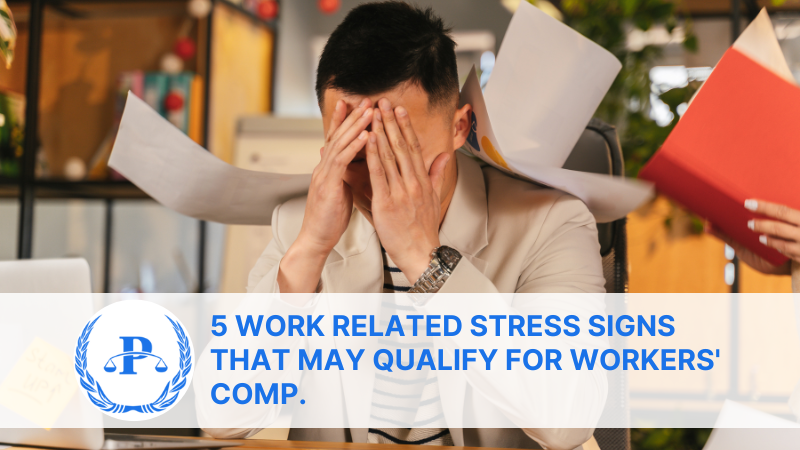More people realize work stress is a health issue. Work related stress can harm your health, job, and personal life. Stressed workers may qualify for workers’ compensation. To safeguard your rights and health, you must recognize work-related stress that may qualify you for pay. In this article, we will delve into the top 5 signs of work related stress that may qualify for workers’ compensation.
What are the 5 Signs of Work Related Stress That May Qualify For Worker’s Compensation?
The five primary symptoms of work-related stress that may qualify you for workers’ compensation are:
- Long-term stress physical symptoms: Many don’t realize that stress can create mild to severe physical issues at work. Long-term worry can affect the body and make it hard to work. Work-related stress can cause persistent headaches, gastrointestinal issues, stiff muscles, and high blood pressure. Long-term stress can cause heart disease, stroke, and sleep disturbances. If your job or workplace caused your physical symptoms, you may qualify for workers’ compensation. Stress-related physical health issues are genuine and may be physically demonstrated, making claims easier.
- Work related stress-related mental diseases: Work related stress can cause anxiety, depression, and PTSD. These symptoms are becoming recognized in workers’ comp situations. Workplace anxiety can be caused by high job expectations, employment insecurity, or negative relationships with coworkers or superiors. Work-related stress can induce persistent unhappiness, fatigue, or loss of interest in activities. Dangerous employment might trigger PTSD due to stress. First responders, healthcare workers, and law enforcement officers are at risk.
- Mental Health Issues: Mental health issues are harder to notice than physical injuries, making workers’ compensation for stress claims difficult. If you can prove that work-related incidents or stress caused your mental health issues, you may be eligible to seek workers compensation for mental health. Burnout from too much work and not enough support: Burnout is complete emotional and physical exhaustion. Long-term work stress from too much work or not enough managerial help causes it. Burnout symptoms include fatigue, poor performance, impatience, and job disinterest. Employees may not like their work or feel accomplished. Burnout can make it hard to accomplish your job, resulting in poor performance and blunders that could endanger others. Burnout victims may be compensated if they can prove their employer caused it. This could mean too much work, short deadlines, or not enough tools or supervisor aid.
- More absences and poorer performance: If job worries interfere with work, there may be a greater issue. Stress can prevent a person from working, which is a disability. Worry might cause health issues that require more sick days, leading to missed work. Workers who show up may be less productive due to mental fatigue or inability to focus. Certain employment conditions or requirements might directly induce stress and lower work productivity. If they can prove that their work environment induced a mental or physical condition that made them less productive, stressed workers may be eligible for workers’ compensation.
- Sleep issues, chronic fatigue: Changing sleep habits is a frequent stress symptom. Chronic fatigue can make it challenging to manage work and life if work stress keeps you from sleeping. Stress can induce insomnia, nightmares, and frequent awakening. Poor sleep can impair focus, memory, and decision-making. Sleep deprivation can cause fatigue, leading to blunders at work, accidents, and difficulty with simple tasks. If stress at work causes sleep issues or weariness that makes it impossible to work and maintain a healthy work-life balance, they may be eligible for compensation. Doctors and sleep experts can verify your stress at work claims.
Wrapping Up
Knowing how to recognize work stress and your rights can help you earn the money you need and stay healthy. Stress-related claims may be harder to prove, but they’re worth trying if your employment adversely affects your mental and physical health.
If you have any of these symptoms, see a doctor and possibly a workers’ compensation lawyer to discuss your options. You can recover mentally and financially from work stress. At the Law Office of Spiro K Pistiolas, A Workers’ Compensation Attorney, we represent the best work injury lawyers who have experience in handling a wide range of cases. Contact us today at (844) 414-1768 to schedule a free consultation with our work injury lawyers.











